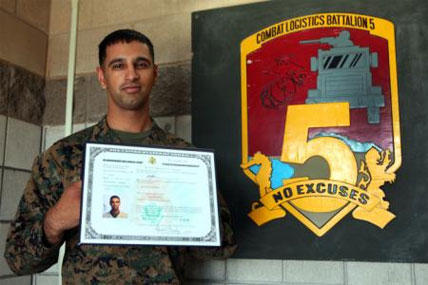CAMP PENDLETON, Calif. – After spending more than half his life away from India, the country in which he was born, Cpl. Jasdeep Singh decided to serve in the Marine Corps, fighting for a country that provided his family prosperity and opportunity.
It wasn’t until 2012 that Singh had the chance to become a citizen, but it wasn’t on American soil.
Singh learned of an opportunity affording non-citizen Marines to become neutralized during their deployment.
“I finished my package about two weeks before we left for Afghanistan,” said Singh, supply administrative chief, Combat Logistics Battalion 5, 1st Marine Logistics Group. “I became a citizen the third month we were out there.”
Before Singh joined the Marine Corps and became a citizen, he didn’t always have the feeling of belonging. When Singh first arrived in the US at the age of seven, he found it hard to adapt to the American way of life.
“[India] is a completely different environment. It’s not like your typical urban-city environment,” said Singh. “The roads are made of dirt, and there were mud huts instead of houses.”
The culture shock wasn’t the most difficult part for Singh.
“Trying to make friends was the hardest thing for me to adapt to, because I didn’t know English,” said Singh. “I learned a lot of English during Kindergarten.”
Once Singh graduated from high school, he felt unsure of which direction to take his life.
“I wanted a challenge,” said Singh. “Coming out of high school, I wasn’t really motivated to go back and sit in a classroom again for college. I wanted to do something more physically and mentally demanding. And that’s exactly what I got with [the Marine Corps].”
This life altering decision was one he made alone.
“I told my parents after I did it. My dad was proud, but my mom was kind of worried,” explained Singh. “They’re both proud now. I’m the first and only to join in my family, so they tell everybody.”
His mother, Parvinder Kaur, recalled the day her son graduated recruit training as one of her proudest moments.
“He not only made the decision, but he also carried out that decision,” said Kaur. “I cried the day he said, ‘I can do it,’ and left for recruit training. Three months later, when he returned and said ‘I did it,’ I was prouder than I’ve ever been in my life.”
Soon after joining, he traveled to Camp Dwyer, Afghanistan, where he would also become a citizen during his first deployment.
“I went to Afghanistan with CLB-5 back in April 2012 and came back August 2012,” he said. “It was a really good experience. We helped tear down one of the areas out there. Our goal was to retrograde as much of the equipment out there as possible.”
During his time on deployment, he met a lot of people from other countries, including his own.
“They have contractors working out there from India, Kenya – pretty much from all over the world. A lot of the Indian guys I got along with really well. A lot of them worked in the mess hall, so they used to hook me up,” he joked. “I used to ask for a slice of pecan pie, and they’d give me the whole pie.”
It wasn’t just the contractors he got along with. Singh found being deployed brought his unit closer together. The ability for Marines to come together under stressful circumstances is one of the reasons Singh loves what he does.
“My plan right now is to stay in the Marine Corps. I like the camaraderie,” said Singh. “You feel like you belong. No matter what you do, you’re in the same uniform as everyone else. Those are your brothers and sisters who are always there for you.”
Singh returned from his combat deployment a year and a half ago, but his mother still remembers the gut-wrenching feeling of having her son in a dangerous environment.
“He fights for this blessed country and that’s something remarkable,” said Kaur. “It’s scary just to hear about war, but knowing your own blood is part of it, that’s a unique feeling only some may experience.”
Though she recognizes the hazards of her son’s deployment, Kaur said she’s glad for the shortened two-week process in which her son had the opportunity to become a citizen.
“It was very difficult for me to become a citizen. The whole process took roughly 10 months,” said Kaur. “He’s serving in the military for the United States. I think it’s every servicemember’s aspiration to ‘belong’ to the military he’s fighting for.”
Singh still practices and celebrates many of his Indian traditions.
“I still go to temple almost every Sunday, I still pray and there are certain holidays we still celebrate,” said Singh. “There’s a holiday called Rakhi. That’s a brother-sister day where your sister will come to you and you have to tie a wrist band on her wrist and give her whatever she asks for.”
Singh said he will be forever grateful for having the opportunity to become an American citizen in such a unique location and among his brother and sisters in arms and still being able to uphold his Indian culture.
“It’s pretty difficult to become a citizen. It means a lot, because at first I was feeling like I was fighting for a country I didn’t necessarily belong to,” said Singh. “After the ceremony, I got that feeling like my country was there for me just as much as I was there for it.”



























